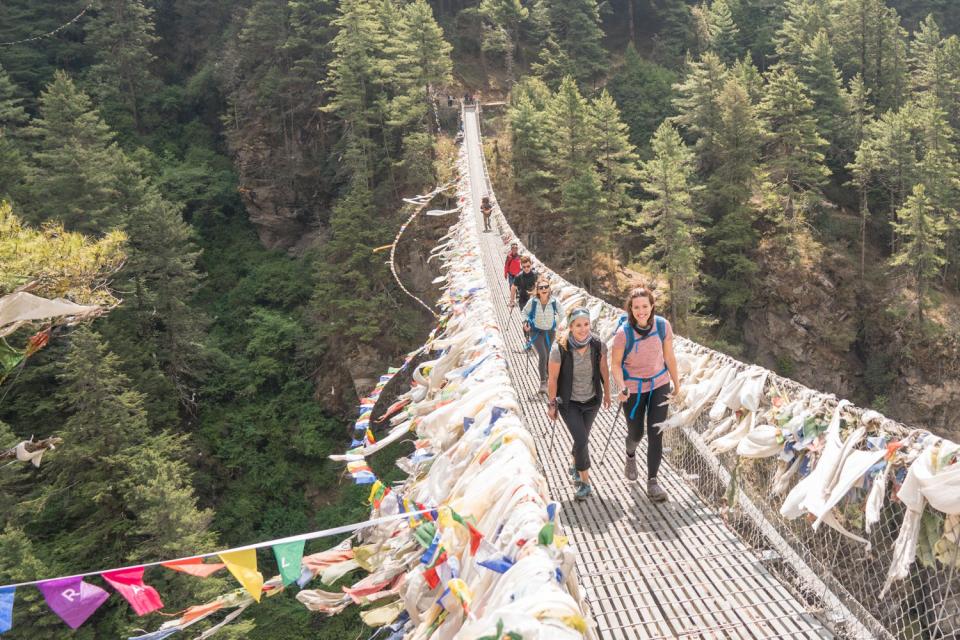Exclusive: Mandy Moore and Melissa Arnot Reid on the "Emotional Hangover" After Reaching Everest Base Camp
It's only been 48 hours since Mandy Moore and Eddie Bauer guide Melissa Arnot Reid returned from the Himalayas—where they accomplished their goal of reaching Everest Base Camp—and Arnot Reid is already packing for another adventure: climbing Mont Blanc as part of a mentorship trip in France. "I'm in a place called chaos," she jokes of the few hours she's home in Seattle before boarding another flight. "I don't have time for jet lag, I just have to move on to the next [adventure]."
It's that love of adventure that bonded Arnot Reid and Moore when they first met late last year. "We were in Jackson Hole, Wyoming at an Eddie Bauer girls trip/excursion, and I remember immediately being drawn to her," Moore recalls of Arnot Reid, who is the first American woman to summit Mt. Everest without supplemental oxygen. "I was like, This girl is so rad, I want to be friends with her." So, over the course of that weekend, the idea to team up—and eventually hike to Everest Base Camp—was planted and the rest is history.
Well, almost. Ask anyone who's ever planned a trip anywhere and the logistics aren't quite that easy. Factor in that Moore had a specific window of time given her This Is Us filming schedule, and Arnot Reid is always adventuring somewhere (often with her young daughter and husband), and you might need the help of a wedding planner. Oh, and then there was the small detail of weather, which dictates when one can trek to a place like Everest base camp, which sits at 17,600 feet. In the end though, "it aligned perfectly," Moore says.
Now, in their first interview since returning, Moore and Arnot Reid open up about the life-changing moments from their epic trip and how they coped with learning of the tragedies happening on the world's tallest mountain.
Glamour: Congratulations on an impressive accomplishment. How difficult has it been to acclimate back to daily life?
Mandy Moore: It’s pretty jarring, even just the little things. Like yesterday, I was like, ‘Oh, a car. A car driving down the street.’ I know that sounds ridiculous, but when you're two weeks away from your regular routine, it just knocks you out of it. It’s going to take a couple days to reintegrate into society, but you have this new lens on the world around you—a deep gratitude and appreciation and purpose. It’s pretty life-affirming and life-altering.
How are things different physically and mentally?
Melissa: There’s always a bit of a physical and emotional hangover after you achieve a big goal that you’ve been planning for. Once it’s done there’s this massive space because you don’t realize how many things you’ve been doing surrounding that, such as [constantly] thinking, Oh, don’t get hurt, or I want to stay healthy, or, Be strong. Now that you don’t have that centerpiece, I always find that there’s a bit of an emotional hangover, and physically, too. To suddenly stop [that daily physical journey] makes you hyper-aware of how physically stagnant we can be in our daily lives.
Mandy, is that how you felt, too?
Mandy: Yes, there is a bit of an emotional hangover. I don’t want to say the blues, but there’s just like a dip just in the sense of purpose. Everything has been leading up to this, or I knew this was on the horizon, so it was like, ‘I can’t get a cold, because I want to be healthy for base camp, but I want to be able to work out and get stronger.’ Now that that is sort of off the table, I don’t want to say you feel purposeless, but there’s a bit of a hole. [It's like], what’s next? Physically, I feel stronger. I carry myself with a greater sense of purpose. I’m like, Wow, I did that. I didn’t know if I was going to be capable of it, and we all did it together. You feel deep accomplishment and gratitude to your body for being able to carry you forward when you didn’t know if you could do it. But other than that, I have an appreciation for the oxygen. [Laughs]
Once you achieved your goal of getting to Everest base camp, was there a part of you that wanted to keep going?
Mandy: It was mixed. I knew it was not possible for us to keep moving forward from this spot on this particular trip. It’s not the kind of thing that you can plan on a whim. But I kind of knew once we got to Nepal and once we started on this trek, I was like, Oh, I will be back. This is not the last time I’m seeing these mountains and seeing these sights and walking on this path.I would love to do this with my husband. I’d like to come back with Melissa and try climbing a peak or two in the area. So because of that, I wasn’t fooling myself into thinking, We’re going to be able to go a little further than we had planned on and that wasn’t an option. Physically it felt like we could have!
Melissa, what is it about Everest that has that special place in your heart?
Melissa: It’s not something that requires words once you feel it. Walking through all the peaks makes me feel closer to everything in life that’s real, if that makes sense. It’s not that it’s such high altitude, it’s just energetically very sacred. The first time I saw it, I felt so comfortable, so curious, like it was my place.
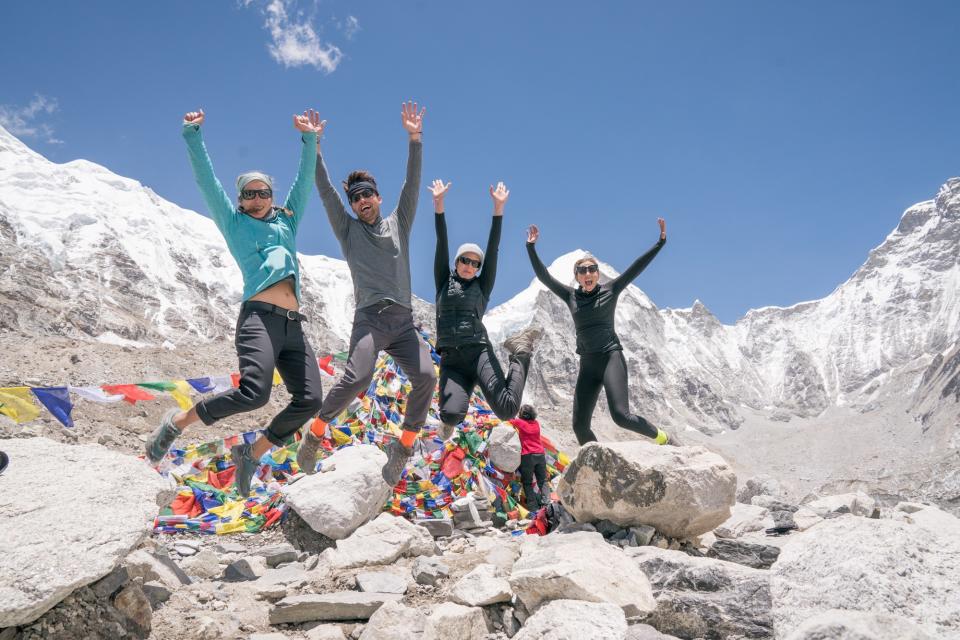
Mandy-Moore-Mt-Everest-Celebration-2019.jpg
Julian ApseYou also don't take just anyone to Everest Base Camp. Why was Mandy such a perfect fit?
Melissa: I'm incredibly particular who I share my adventures with [as a professional guide], especially in Nepal, because I have such an amazing family of local people there and I protect it with a lot of intimacy. When I met Mandy, I didn’t have any preconceived notions of what she would be like, or what her friends would be like. But [I quickly] saw this spark and seriousness that Mandy had, which was really tempered with this wistful excitement about something she didn’t know anything about but wanted to know more. I saw that in myself when I was 20 years old and learning how to climb. So when I saw that [in Mandy] I started to wonder if it this would be a possibility. I do believe these adventures happen when they are meant to happen. And everything worked out so beautifully.
It's also an overwhelming experience. How did you keep any anxiety in check?
Mandy: I think it’s all part of it, like the travel is part of it, the sleep deprivation, traveling into the unknown...all of that really excites me and motivates me and I’m grateful for it. I just know it’s part of the process and I lean into it. I trust Melissa with my life, obviously, as we all do, and I know how special and sacred this part of the world is. I’ve been so curious about the Himalayas, so I was just ready for whatever the universe was going to throw at me. I wasn’t nervous. I felt prepared, or as prepared as I could be, and just very open and ready.
Melissa: It’s really important to be overwhelmed by the experience of it. I think that one of the things…
Mandy: You can’t not be.
Melissa: Yeah, it’s impossible not to be. If we lead with curiosity, no matter what happens, the experience is really wonderful. [But] if we lead with just this idea of people are going to think I’m so amazing for doing this, it ruins the experience in a way and you don’t get to have that really nice, overwhelming feeling of feeling just in total awe of everything around you...the culture, the views, and the geography.
This was one of the deadliest years on record on Mouth Everest, and it was in the news almost daily over the last week. Did your trek to base camp take on new meaning as you learned what was happening?
Melissa: There are hazards and you do need to be experienced to be there and it is very important, and it is not very casual. One thing I can say from my side that I do appreciate about that is that all of us who entered with this total enthusiasm and that desire to keep going when you get to base camp, it’s really tempered with the proper humility of like, ‘Yeah, if I do want to keep going, I have some work to put in.’
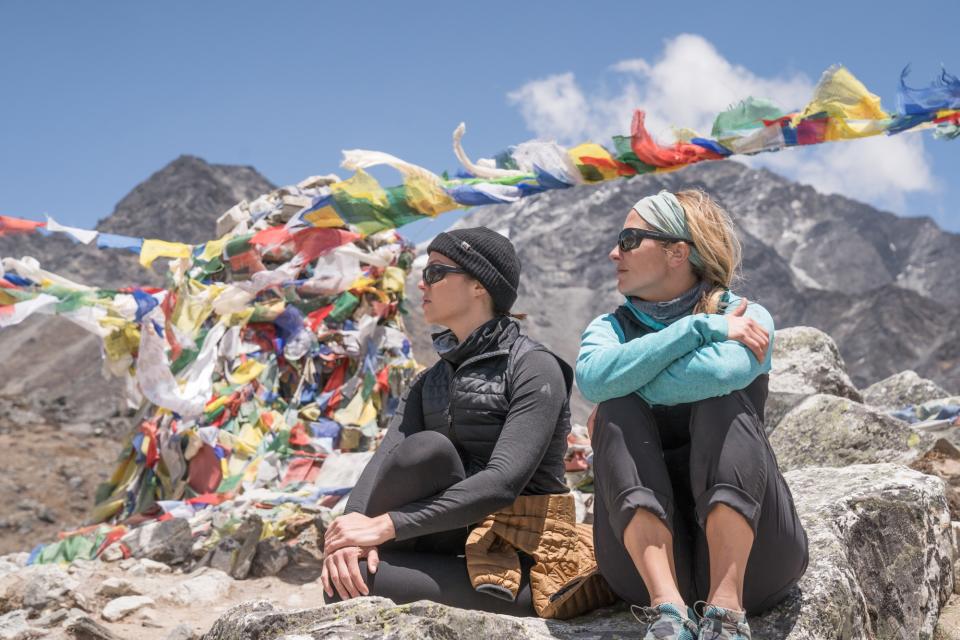
Mandy-Moore-Melissa-Arnot-Reid-Mt-Everest-2019.jpg
Julian ApseWhat about you, Mandy? How did what was happening on the summit affect you?
Mandy: It wasn’t lost on any of us, and in fact, I feel like the most impactful part of the trip for me was not reaching base camp. Melissa instilled this idea that every day there was something to celebrate and to acknowledge, and for me, I think the most impactful day was when we reached Tukla Pass, this point of the trek where there are hundreds of monuments to people that have lost their lives in the mountains, not necessarily just on Everest. You could not help but be entirely overcome with this sense of reverence and respect and appreciation for how powerful these mountains are, and the loss of these lives. It’s just really...it really hit me. It was so undeniably emotional and beautiful...this appreciation for what we were doing and all those that have come and walked before us. So absolutely that was in our minds and we’re just grateful we had the ability to keep putting one foot in front of the other and getting to have this unbelievably magical experience. Just so lucky.
Is there anything you would have done differently?
Mandy: We had no better teacher and example than Melissa. She was so thorough and she was with us every step of the way, but we were still very much able to have this fully realized experience and let it unfold in front of us. There’s nothing I would really do differently [except maybe] I would be a little better with my sunscreen application. I have this weird line on my hands from when I was trekking with the pole. My hands are really sunburned. They are a different shade than the rest of my body. [Laughs] So I’d be a little better about applying sunscreen, but otherwise no, it all was what it was supposed to be.
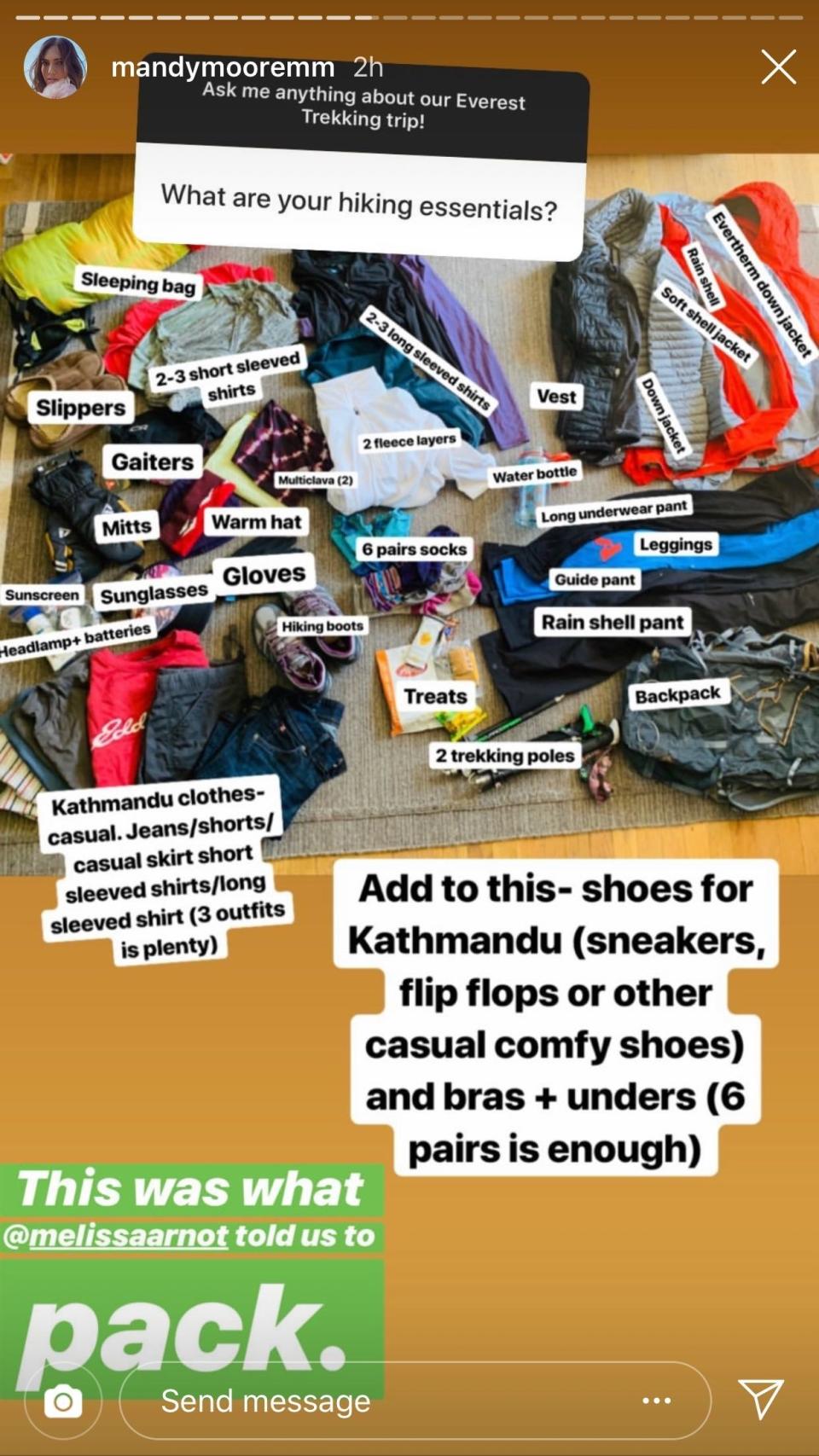
Eddie-Bauer-packing-essentials-mountaineering.JPG
Mandy Moore/Instagram StoriesWhen you go through an experience like this, it puts life in perspective. Mandy, how does that help you as an actor, a singer, a producer? And Melissa, how about you, as a mom, a mentor, and a guide?
Melissa: That’s why I spend time in the mountains, because of the perspective it gives me in the rest of my life. It gives me hope about humanity and our ability to do things together as a team, even when it’s challenging. Mountains teach us how to be resilient and team-reliant, and I think those skills tend to be a little bit underutilized in our daily lives. We got to practice being in rhythm with nature for seven days in a row. It’s so rejuvenating.
Mandy: It is very soul-fulfilling and it’s a feeling that I am able to tap into whenever I need to moving forward. I’m assuming it will be the same feeling I did last year when I [hiked] Kilimanjaro. Like the rest of the year I may be ‘landlocked’ here at work and at a job that is fulfilling and I’m so grateful for, but every now and then it’s nice to be able to tap into that energy that built me up while I was on the mountain. It gives me a greater sense of purpose and helps me realize that who I am and what I bring to the table does not begin and end with that certain skill set of just being an actor or a musician or producer or writer or whatever it may be. There’s more to me than what meets the eye. And I feel like this trip continues to solidify this idea that I feel most like myself when I’m outside and when I’m putting one foot in front of the other. It could be when I’m in the Himalayas, it could be when I’m in my backyard. As long as I can feel that sense of connection to the world around me, I’m a better person for it.
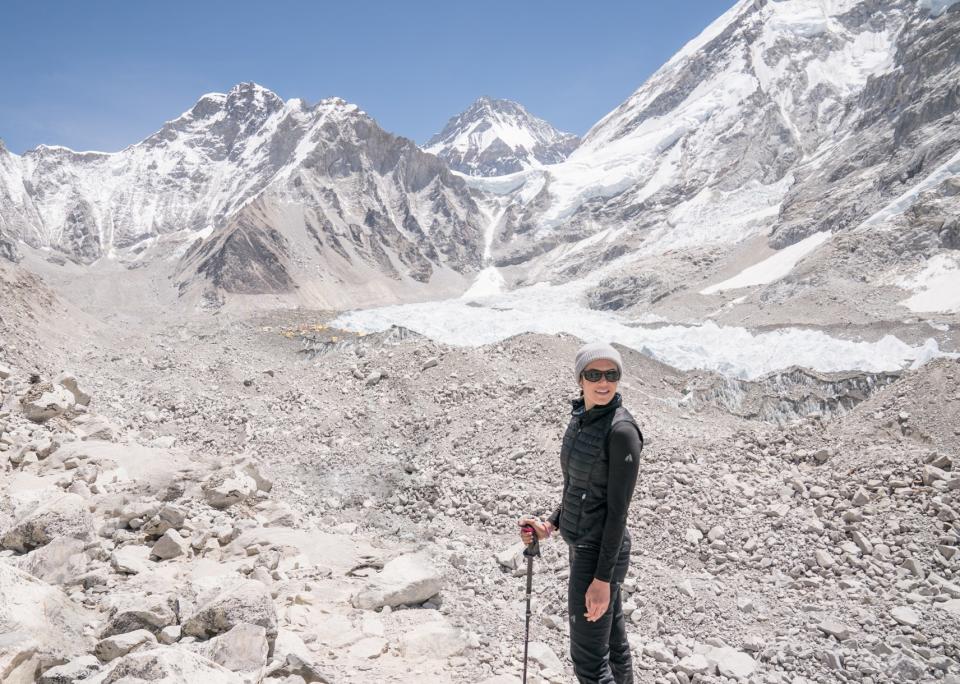
Mandy-Moore-Mt-Everest-Base-Camp-2019.jpg
Julian ApseThis trip wouldn't have been possible without the support of the Eddie Bauer team. How did they make a difference for you?
Melissa: One of the reasons that we had such an amazing trip is that we were so well outfitted with our gear. I’ve been working on building the gear specifically for this [purpose] and refining it perfectly. My goal is that you don’t think about your gear and it’s not at the top of your mind. Eddie Bauer has allowed that to happen, but as a secondary [thing], they allow me to live my adventure all the time. They support my mentorship program, teaching the younger generation about being leaders in the outdoors and having these adventures.
Mandy: They’ve helped me realize my dreams as well.
This interview has been edited and condensed for clarity.
Jessica Radloff is the Glamour West Coast editor. Follow her on Instagram @JessicaRadloff14.
Originally Appeared on Glamour
